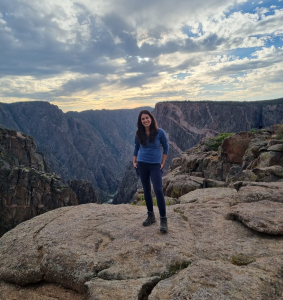This week for #WomenonWednesdays we spoke to Nikita, a PhD student in plasma physics!
As an introduction, describe your pathway into physics, what kickstarted it? 
I was first drawn to physics through maths in high school – I enjoyed the subject itself but liked the applied side much better. Physics seemed to combine the theoretical side of maths into something grounded in reality, at least that’s what I thought until starting quantum mechanics in uni! Once at Imperial I started off terrible at computational physics, but grew to enjoy it over the years, so much so that I ended up doing an MSc in a field called computational fluid dynamics. There is something very satisfying about translating governing equations into a code, and using it to simulate complicated systems. My master’s degree then laid the groundwork for my PhD, which is also based in numerical physics.
What is the topic of your PhD?
I’m doing my PhD within the plasma physics group (now part of the Space, Plasma and Climate community), which has an experimental group and computational group. I work on the computational side, on our in-house magnetohydrodynamics (MHD) code that my supervisor first developed called ‘Gorgon’. This code combines the traditional fluid equations with Maxwell’s equations for electromagnetism. It is used by my colleagues and I to model experiments performed on a pulsed-power facility called MAGPIE at Imperial College (I recommend looking it up), and several other impressive systems such as fusion experiments on large-scale laser facilities. My specific topic has been to implement a “mesh refinement” capability into the code, which uses certain techniques to run much larger simulations using the same computational resources. I’ve been using it to run high-resolution simulations of radiatively cooled Z-pinches, something that’s historically been intractable because of resource limitations.
How did you decide to do a PhD?
Before I started my PhD I was working in a company called First Light Fusion in Oxford, which is looking at alternative schemes to generate fusion energy using low-cost reactors. I was part of their computational team, running models to improve experimental design, and using experimental data to improve computational models. That was really enjoyable, but if you want to do exploratory research (even outside academia) it is useful if not necessary to do a PhD. First Light Fusion offered me a scheme whereby they would fund my PhD at Imperial and I would in return add my improvements into their code. I’ve worked with some great people during my time, there many of whom have done a PhD and have strongly benefited from the experience.
During your journey, what has been your experience being a Woman in Physics?
I think my personal experience has been informed both by being the one of the few females in a fairly male-dominated group, but also coming from a different background. I grew up in Singapore, which is a very different place from the UK, not least because it’s over 6000 miles away and summer all year round! It’s been an adjustment to more than the weather, but London is a good place to be as you’re surrounded by many people in a similar boat bringing their culture and cuisines to the city. During the course of my PhD I’ve gone on conferences and trips with colleagues, and of course slogged through the thesis, through which you gain shared experiences and become good friends. I’m also fortunate enough to work with people that don’t treat me or my work as any less because I’m a woman. Historically there have been few females in the group, and when I joined four years ago I was the only one. However, that’s visibly changing; the last few years have brought more female PhD students, and our first female academic recently joined. It’s important to have representation at a senior level to encourage more women to join after undergrad, and was certainly a motivating factor for me when pursuing a PhD.
What advice would you give your undergraduate self?
I think it would be to get more involved or reach out more proactively to academics about their research. There’s a lot that goes on in the department that you may not be exposed to as an undergrad, but striking up a conversation with demonstrators, academics during office hours, etc about their field can be a useful way to learn about the applications to the theory you are studying. This may not be of direct use in the course, but further puts in to context what you’re learning and why. There’s a lot of cool research going on within Blackett, and I’d encourage anyone to stick their neck out a bit and ask questions, something I wish I’d done more of!